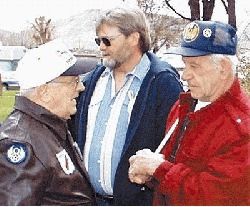World War II POW shares his story
Published 12:00 am Monday, April 7, 2003

- Allen J. Chapin, a retired air force lieutenant colonel, left, found a fellow traveler in John Atkinson, right. Both were crewmen on planes shot down during World War II, and both men were held as prisoners of war. (Baker City Herald/Kathy Orr).
By GERRY STEELE
Trending
Of the Baker City Herald
Allen Chapin probably understand as well as anyone the meaning behind Saturday’s Rally Up America! gathering at Geiser Pollman Park.
The rally, attended by more than 200 people clad in red, white and blue, and wearing yellow ribbons, was held to honor the men and women fighting with the U.S. military forces in Iraq.
Trending
Chapin, a retired Lt. Colonel in the Air Force who now lives in Richland, was held as a prisoner of war by Germany for two years during World War II. He knows how important the support from the people at home is for members of the armed forces, especially those who have been, or are, prisoners of war.
andquot;I’d like to talk to you about being a prisoner of war,andquot; Chapin said.
andquot;Especially I’d like to discuss the differences of being a prisoner of war during World War II and the present war.andquot;
Chapin said one of the biggest differences between the two wars is that during World War II most combatants, except Japan, handled their POWs under the provisions of the Geneva Convention.
andquot;In Iraq they didn’t sign the Geneva Convention, or, if they knew about, chose not to follow it, or ignore it,andquot; he said.
Chapin said the Geneva Conveition talks about facilities, food and sanitation as far as taking care of the POWs.
andquot;In World War II the Red Cross representatives would inspect combatants’ POW Camps. Today, in Iraq, the Red Cross is not allowed to inspect anything involving POWs,andquot; he said.
andquot;During World War II, American, British and Canadian Red Cross representatives sent and assured delivery of food parcels to POWs. Today, the Red Cross cannot send or deliver food to the POWs,andquot; Chapin said.
During his days as a prisoner of war, Chapin recalled, the men relied on the packages they received regularly from the International Red Cross which the Germans permitted them to keep.
andquot;Ours came from America, Canada and Great Britain,andquot; he said. They usually contained cans of Spam, salmon or corned beef, powdered milk, a little sugar, and cigarettes.andquot;
Treatment of the POWs is quite different today as well, he said.
andquot;During World War II, POWs could not be tortured. Today, the captured coalition POWs are being tortured.andquot;
Chapin said that it appears that as the wars become shorter, at least from Desert Storm to the present, individual POWs have harsher conditions to endure over a much shorter period of time.
andquot;Since 1991 time has become compressed in the wars,andquot; he said.
andquot;In my opinion, the one thing that will help a POW cope with extremely difficult and life threatening circumstances is faith,andquot; Chapin said.
andquot;Faith in him or herself that the present and future difficult circumstances can be overcome, faith that the country has not forgotten them, and faith in whichever God they worship.andquot;
Becoming a POW
On Aug. 17, 1943, luck ran out for Chapin who was co-piloting a B-17 with the Eighth Air Force, U.S. Army Air Corps. His Flying Fortress was shot down on its 15th mission, and all 10 men aboard parachuted to the ground.
Five of the men, including Chapin, met up with resistance fighters. Four of them were safely transported through France and into Spain and made it home. Chapin’s luck ran out again.
andquot;I was with the resistance 10 days before I was picked up in civilian clothes in Paris. They could have shot me, but instead they imprisoned me for six weeks before I was transferred to Stalag Luft 3, in Sagan, Germany,andquot; he said.
You won’t find Sagan on a German map anymore; it is now a part of Poland. But if you want to see a Hollywoodized version of what happened there, rent the video andquot;The Great Escape.andquot; The late Steve McQueen made his spectacular jump over the prison fence on a motorcycle.
The Stalag was reputed to be escape proof, but the Allied soldiers inside took that as a challenge. There was an escape, but Chapin was not a part of it.
andquot;Seventy-three British dug out of the camp, and 70 were recaptured. Three got home,andquot; he said.
andquot;Of the 70 who were recaptured, the Germans murdered 50 of them.andquot;
Chapin, who was born in Toledo, Ohio, and entered the military at age 19, didn’t know it, but a Baker County native, George Nicolescu, was in Stalag Luft 3 at the same time.
In January 1945, the Russian Army andquot;liberated the camp,andquot; and the prisoners were marched out during andquot;the worst snowstorm in 50 yearsandquot; towards Munich.
Chapin said they walked for two weeks through the snow before they were picked up by a train for the rest of their journey. He said they remained, still virtually prisoners, until Gen. George S. Patton arrived with American and Allied troops to set them free on April 29, 1945.
Chapin went to college under the GI Bill and worked with United and Frontier air lines until September 1948 when he was recalled to active duty in the U.S. Air Force. He remained there until he retired as a lieutenant colonel in 1966. His last assignment with the Air Force was working with staff from the Massachusetts Institute of Technology integrating radar and computers, a system that was used worldwide for many years.
Nicolescu returned to Baker County and married Bonnadene Wolfe, daughter of Helen Wolfe of Sun City, Calif. He became a Baker County commissioner and served with the Education Service District and with the Soil Conservation Service. He was a community leader and served as president of the Oregon Cattlemen’s Association. He and Bonnadene were married 47 years until his death in 1993.
Bonnadene kept up her late husband’s interest in the Ex-POW organization and in June 1997 attended the 50th anniversary celebration of the liberation of Europe, where she met Chapin.
Chapin, also a widower, was then living in Friday Harbor, Wash., semi-retired after many years of public and private service.
Love blossomed, and the two were married in a ceremony at the Geiser Grand Hotel. They celebrated their fifth wedding anniversary this past Feb. 14.
Bonnadene accompanied Chapin to the ceremony Saturday.
Chapin, at 80, is very active in the Eastern Oregon Chapter of the American Red Cross.









